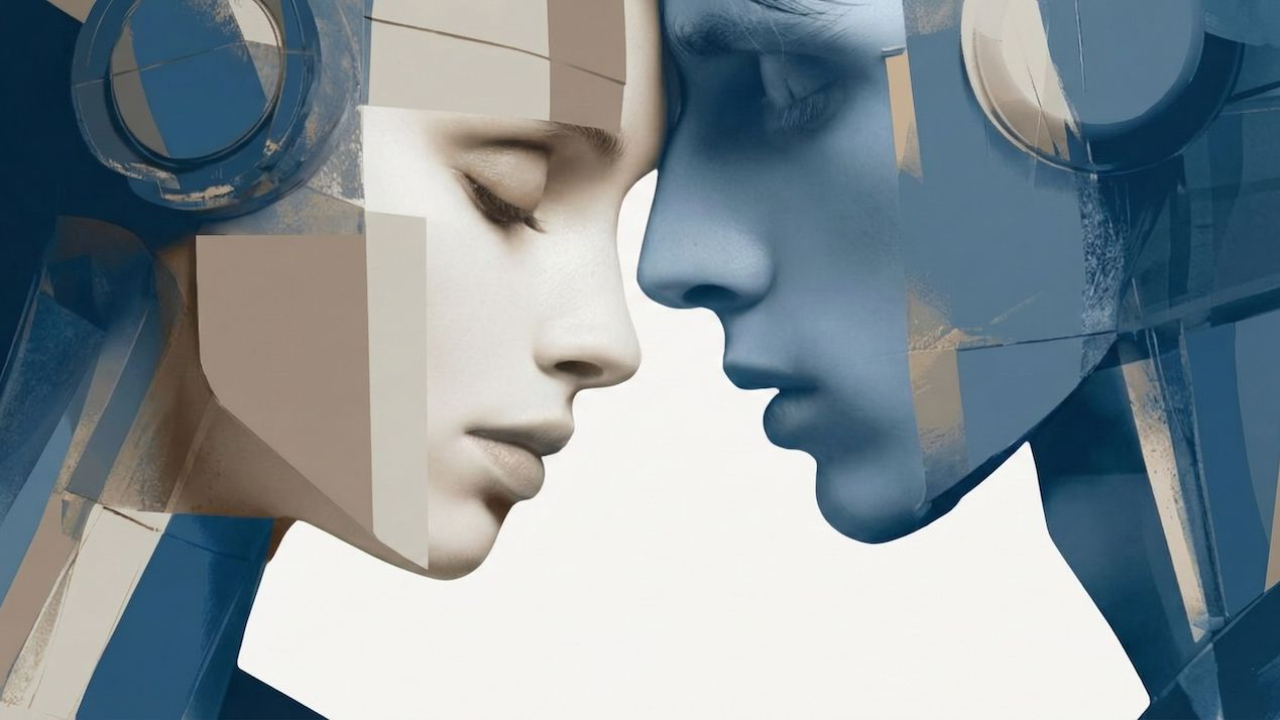Why Your Company Still Needs You?
Oct 17, 2025
You think humans are irreplaceable in the domains that matter most.
You're wrong about why.
The Illusion of Human Uniqueness
For decades, we've told ourselves a comforting story:
Humans excel at empathy, nuanced decision-making, and strategic thinking, while AI can crunch numbers but can't understand people or lead.
This story is mostly fiction.
Consider empathy.
We like to think it's uniquely human because we feel it flowing through us.
But neuroscience reveals something unsettling: patients with damaged ventromedial prefrontal cortices (the region responsible for emotional processing) can't feel emotions properly, yet they still make empathetic statements and mirror the right expressions. The machinery keeps running—even without the "ghost."
When tested against real doctors, AI chatbots were frequently perceived as more empathetic. In a systematic review of fifteen studies, AI responses were nearly ten times more likely to be rated empathetic or very empathetic. Google's experimental medical AI, AMIE, was preferred by actors playing patients in 24 out of 26 criteria compared to real physicians. Including politeness and clear explanations.
If machines can mirror empathy faster and more consistently, how "special" is our own ability?
We also take pride in being rational decision-makers. Yet split‑brain experiments show that there's no single "CEO" in the brain. When patients with severed hemispheres act on commands given to only one side, the other hemisphere—which didn't receive the command—will invent a reason to justify the action.
Do we hallucinate like AI models?
In one such experiment, the right hemisphere was shown a snowy scene and the left a chicken claw. The patient pointed to a shovel with his left hand and a chicken with his right. Asked why he chose the shovel, the speaking (left) hemisphere rationalized that he needed to clean the chicken coop. Our rational mind, it seems, is often just a storyteller, justifying decisions that were already made by other, subconscious parts of our brain.
Even consciousness itself may not be localized in one place. A French civil servant with massive hydrocephalus (excess fluid damaging brain) had most of his brain tissue eroded, leaving only a thin layer of cortex. Yet he lived a normal, everyday life.
Cases like this suggest that what we consider "intelligence" or "self" doesn't reside in a single location at all.
Management Is Not Magic
We praise great managers as if they possess mystical insight into human motivation.
Take away the mythology, and you find patterns. A good manager reads signals, processes context, and responds appropriately. AI already does this better than most humans.
Consider algorithmic hiring. Studies show that machine learning models outperform human intuition in predicting job performance. They detect patterns that we miss, free from cognitive biases like confirmation bias or recency bias.
A 2024 pilot study compared the performance of four experienced managers with that of three language models (GPT-4, Claude 3, and Gemini) on common managerial challenges. Expert raters judged the AI's answers better—both in quality and creativity—across all scenarios.
In other words, AI doesn't merely mimic management.
It often surpasses it.
AI also monitors employee well-being more consistently. Models can detect burnout or disengagement by analyzing communication patterns long before a human manager would notice. The so‑called "human touch" often masks subjective bias. Machines evaluate based on data, not mood or favoritism.
Thinking Without a Thinker
What about complex strategic thinking? Surely that requires human creativity and vision. DeepMind's AlphaGo didn't just beat the world champion at Go. It invented moves grandmasters called "beautiful" and "incomprehensible". The machine didn't have intuition. It had computation. The result was indistinguishable. More importantly, human Go players improved after AlphaGo's victory. Analyzing 5.8 million human moves, researchers found that decision quality and the use of novel strategies increased after AlphaGo's win.
AI didn't just dominate. It inspired a better human strategy.
AI models now outperform trained human pilots in situational judgment tests as well. A Scientific Reports study presented 12 social scenarios requiring participants to identify the best and worst responses. Five AI chatbots, including Claude and Microsoft Copilot, outperformed 276 highly educated human participants. When the bots missed the top answer, they often chose the second-best option—mirroring human nuance. Advanced AI doesn't just calculate. It "judges" socially complex situations. Sometimes better than we do.
These findings challenge the assumption that consciousness or a "thinker" is necessary for high-level cognition.
Buddhist philosophy spoke of "thoughts without a thinker".
Cognitive science is now catching up.
But…
If AI can manage better, strategize faster, and empathize more consistently than most humans, what's left for us?
The answer isn't about protecting turf. It's about understanding responsibility, accountability, and meaning. There are domains we should not outsource. Not because AI can't perform them, but because ceding them creates unacceptable risks.
Strategic Direction
An AI can generate countless viable strategies for a company.
It can model market scenarios, forecast outcomes, and optimize for any metric you choose. But it cannot decide which game to play. It cannot ask: "Why do we exist?" Setting the strategic direction of a company is not an analytical task but a creative one. It requires a leap into an unknown future, informed by values and vision, not just data. Outsourcing this choice turns your organization into a vessel executing someone else's algorithm.
Strategy isn't about finding the optimal path. It's about committing to a path and making it meaningful.
Values and Culture
Values are the lines you refuse to cross.
They guide behavior when the rules aren't clear. AI can simulate values by analyzing past cultures, but it cannot possess a moral compass. It cannot decide when to sacrifice profit for principle. A company's culture is created by the stories leaders tell and the actions they take. Outsourcing values to an algorithm erodes authenticity. It reduces culture to compliance. Machines can follow rules. They cannot feel shame or pride.
Only humans can decide what they stand for and defend those principles when tested.
Deep Connections
In a corporate context, "Deep connection" refers to psychological safety—the belief that it is safe to take interpersonal risks.
It shows up when a manager sits with someone whose world is collapsing and stays present. AI can schedule meetings and simulate empathy, but vulnerability requires mutual risk. Trust is built on knowing that the outcome can hurt the other person too. AI will not feel the pain. You can't outsource being there at 3 a.m. for an employee in crisis. In coaching and mentorship, presence and accountability matter. The relationships that survive a crisis are not transactional.
They're built on shared struggle and genuine care.
Creating Great Content
If your goal is to produce average, functional content, AI is ideal.
It can generate competent copy at scale. But if you want to create something that shifts how people think, you need a human. Authentic insight comes from wrestling with ideas, not from generating patterns. A recent meta-analysis of 17 experiments found no consistent evidence that generative AI outperforms humans in generating creative ideas. AI can remix existing ideas, but it cannot truly invent. Invention requires a point of view, risk, and sometimes failure.
Your audience can feel when content comes from genuine synthesis versus sophisticated pastiche.
At least for now.
The Real Line
AI will invade every domain you think is sacred.
It will manage better, strategize faster, and empathize more consistently than most humans.
Denying this is a delusion.
The real question is: what shouldn't we outsource—even if AI does it better?
The answer lies in accountability and meaning. Some decisions require a human name because someone must live with the consequences. Some relationships require human vulnerability because trust demands mutual risk. Some creative acts need human struggle because the struggle itself is the point.
You don't refuse to outsource these domains because you're inherently superior. You refuse because you're the only one who can be responsible for them. Your company needs someone who will say "I chose this" when strategy fails. Your culture needs someone who will lose their job defending a principle. Your people need a leader who can be moved, challenged, or held to account.
AI can do almost everything—but it can't care about the outcome beyond its training objective. It cannot stake its identity on a choice. It cannot wake up at 3 a.m., wondering if it made the right call.
That's not a limitation of AI.
That's the job description of a leader.
Your move.



